- Home
- Wendell Berry
New Collected Poems Page 22
New Collected Poems Read online
Page 22
III.
When it got there
where was it?
LOOK IT OVER
I leave behind even
my walking stick. My knife
is in my pocket, but that
I have forgot. I bring
no car, no cell phone,
no computer, no camera,
no CD player, no fax, no
TV, not even a book. I go
into the woods. I sit on
a log provided at no cost.
It is the earth I’ve come to,
the earth itself, sadly
abused by the stupidity
only humans are capable of
but, as ever, itself. Free.
A bargain! Get it while it lasts.
A LETTER
(to Ed McClanahan)
Dear Ed,
I dreamed that you and I were sent to Hell.
The place we went to was not fiery
or cold, was not Dante’s Hell or Milton’s,
but was, even so, as true a Hell as any.
It was a place unalterably public
in which crowds of people were rushing
in weary frenzy this way and that,
as when classes change in a university
or at quitting time in a city street,
except that this place was wider far
than we could see, and the crowd as large
as the place. In that crowd every one
was alone. Every one was hurrying.
Nobody was sitting down. Nobody
was standing around. All were rushing
so uniformly in every direction, so
uniformly frantic, that to average them
would have stood them still. It was a place
deeply disturbed. We thought, you and I,
that we might get across and come out
on the other side, if we stayed together,
only if we stayed together. The other side
would be a clear day in a place we would know.
We joined hands and hurried along,
snatching each other through small openings
in the throng. But the place was full
of dire distractions, dire satisfactions.
We were torn apart, and I found you
breakfasting upon a huge fried egg.
I snatched you away: “Ed! Come on!”
And then, still susceptible, I met
a lady whose luster no hell could dim.
She took all my thought. But then,
in the midst of my delight, my fear
returned: “Oh! Damn it all! Where’s Ed?”
I fled, searching, and found you again.
We went on together. How this ended
I do not know. I woke before it could end.
But, old friend, I want to tell you
how fine it was, what a durable
nucleus of joy it gave my fright
to force that horrid way with you, how
heavenly, let us say, in spite of Hell.
P.S.
Do you want to know why
you were distracted by an egg, and I
by a beautiful lady? That’s Hell.
A LETTER
(to my brother)
Dear John,
You said, “Treat your worst enemies
as if they could become your best friends.”
You were not the first to perpetrate
such an outrage, but you were right.
Try as we might, we cannot
unspring that trap. We can either
befriend our enemies or we can die
with them, in the absolute triumph
of the absolute horror constructed
by us to save us from them.
Tough, but “All right,” our Mary said,
“we’ll be nice to the sons of bitches.”
A LETTER
(to Hayden Carruth)
Dear Hayden,
How good—how liberating!—to read
of your hatred of Alice in Wonderland.
I used to hear my mother reading it
to my sisters, and I hated it too,
but have always been embarrassed
to say so, believing that everybody else
loved it. But who the hell wants to go
down a rabbit hole? I like my feet best
when they’re walking on top of the ground.
If I could burrow like a mole, I would,
and I would like that. I would like
to fly like a bird, if I could. Otherwise,
my stratum of choice is the surface.
I prefer skin to anatomy, green grass
to buried rocks, terra firma to the view
from anywhere higher than a tree.
“Long live superficiality!” say I,
as one foot fares waywardly graveward.
A LETTER
(to Ernest J. Gaines)
Dear Ernie,
I’ve known you since we were scarcely
more than boys, sitting as guests
at Wallace Stegner’s table, and I have read
everything you have written since then
because I think what you have written
is beautiful and quietly, steadily
brave, in the manner of the best bravery.
I feel in a way closer to your work
than to that of anybody else of our age.
And why is that? I think it’s because
we both knew the talk of old people,
old country people, in summer evenings.
Having worked hard all their lives long
and all the long day, they came out
on the gallery down in your country,
out on the porch or doorstep in mine,
where they would sit at ease in the cool
of evening, and they would talk quietly
of what they had known, of what
they knew. In their rest and quiet talk
there was peace that was almost heavenly,
peace never to be forgotten, never
again quite to be imagined, but peace
above all else that we have longed for.
GIVE IT TIME
The river is of the earth
and it is free. It is rigorously
embanked and bound,
and yet is free. “To hell
with restraint,” it says.
“I have got to be going.”
It will grind out its dams.
It will go over or around them.
They will become pieces.
QUESTIONNAIRE
1. How much poison are you willing
to eat for the success of the free
market and global trade? Please
name your preferred poisons.
2. For the sake of goodness, how much
evil are you willing to do?
Fill in the following blanks
with the names of your favorite
evils and acts of hatred.
3. What sacrifices are you prepared
to make for culture and civilization?
Please list the monuments, shrines,
and works of art you would
most willingly destroy.
4. In the name of patriotism and
the flag, how much of our beloved
land are you willing to desecrate?
List in the following spaces
the mountains, rivers, towns, farms
you could most readily do without.
5. State briefly the ideas, ideals, or hopes,
the energy sources, the kinds of security,
for which you would kill a child.
Name, please, the children whom
you would be willing to kill.
AND I BEG YOUR PARDON
The first mosquito:
come here, and I will kill thee,
holy though thou art.
DAVID JONES
As t
he soldier takes bodily form
(or dissolves) within the rubble and wreck
of war, so the holy Virgin takes
shape within the world of creatures,
and the angel, to come to her at all,
must wear a caul of birds,
his robe folded like the hills.
TU FU
As I sit here
in my little boat
tied to the shore
of the passing river
in a time of ruin,
I think of you,
old ancestor,
and wish you well.
A SPEECH TO THE GARDEN CLUB OF AMERICA
With thanks to Wes Jackson and in memory of Sir Albert Howard and Stan Rowe
Thank you. I’m glad to know we’re friends, of course;
There are so many outcomes that are worse.
But I must add I’m sorry for getting here
By a sustained explosion through the air,
Burning the world in fact to rise much higher
Than we should go. The world may end in fire
As prophesied—our world! We speak of it
As “fuel” while we burn it in our fit
Of temporary progress, digging up
An antique dark-held luster to corrupt
The present light with smokes and smudges, poison
To outlast time and shatter comprehension.
Burning the world to live in it is wrong,
As wrong as to make war to get along
And be at peace, to falsify the land
By sciences of greed, or by demand
For food that’s fast or cheap to falsify
The body’s health and pleasure—don’t ask why.
But why not play it cool? Why not survive
By Nature’s laws that still keep us alive?
Let us enlighten, then, our earthly burdens
By going back to school, this time in gardens
That burn no hotter than the summer day.
By birth and growth, ripeness, death and decay,
By goods that bind us to all living things,
Life of our life, the garden lives and sings.
The Wheel of Life, delight, the fact of wonder,
Contemporary light, work, sweat, and hunger
Bring food to table, food to cellar shelves.
A creature of the surface, like ourselves,
The garden lives by the immortal Wheel
That turns in place, year after year, to heal
It whole. Unlike our economic pyre
That draws from ancient rock a fossil fire,
An anti-life of radiance and fume
That burns as power and remains as doom,
The garden delves no deeper than its roots
And lifts no higher than its leaves and fruits.
WHILE ATTENDING THE ANNUAL
CONVOCATION OF CAUSE THEORISTS
AND BIGBANGISTS AT THE LOCAL PROVINCIAL
RESEARCH UNIVERSITY, THE MAD FARMER
INTERCEDES FROM THE BACK ROW
“Chance” is a poor word among
the mazes of causes and effects, the last
stand of these all-explainers who,
backed up to the first and final Why,
reply, “By chance, of course!” As if
that tied up ignorance with a ribbon.
In the beginning something by chance
existed that would bang and by chance
it banged, obedient to the by-chance
previously existing laws of existence
and banging, from which the rest proceeds
by the logic of cause and effect also
previously existing by chance? Well,
when all that happened who was there?
Did the chance that made the bang then make
the Bomb, and there was no choice, no help?
Prove to me that chance did ever
make a sycamore tree, a yellow-
throated warbler nesting and singing
high up among the white limbs
and the golden leaf-light, and a man
to love the tree, the bird, the song
his life long, and by his love to save
them, so far, from all machines.
By chance? Prove it, then, and I
by chance will kiss your ass.
MEN UNTRAINED TO COMFORT
Jason Needly found his father, old Ab, at work
at the age of eighty in the topmost
tier of the barn. “Come down!” Jason called.
“You got no business up there at your age.”
And his father descended, not by a ladder,
there being none, but by inserting his fingers
into the cracks between boards and climbing
down the wall.
And when he was young
and some account and strong and knew
nothing of weariness, old man Milt Wright,
back in the days they called him “Steady,”
carried the rastus plow on his shoulder
up the high hill to his tobacco patch, so
when they got there his mule would be fresh,
unsweated, and ready to go.
Early Rowanberry,
for another, bought a steel-beam breaking plow
at the store in Port William and shouldered it
before the hardly-believing watchers, and carried it
the mile and a half home, down through the woods
along Sand Ripple.
“But the tiredest my daddy
ever got,” his son, Art, told me one day,
“was when he carried fifty rabbits and a big possum
in a sack on his back up onto the point yonder
and out the ridge to town to sell them at the store.”
“But why,” I asked, “didn’t he hitch a team
to the wagon and haul them up there by the road?”
“Well,” Art said, “we didn’t have but two
horses in them days, and we spared them
every way we could. A many a time I’ve seen
my daddy or grandpa jump off the wagon or sled
and take the end of a singletree beside a horse.”
OVER THE EDGE
To tell a girl you loved her—my God!—
that was a leap off a cliff, requiring little
sense, sweet as it was. And I have loved
many girls, women too, who by various fancies
of my mind have seemed loveable. But only
with you have I actually tried it: the long labor,
the selfishness, the self-denial, the children
and grandchildren, the garden rows planted
and gathered, the births and deaths of many years.
We boys, when we were young and romantic
and ignorant, new to the mystery and the power,
would wonder late into the night on the cliff’s edge:
Was this love real? Was it true? And how
would you know? Well, it was time would tell,
if you were patient and could spare the time,
a long time, a lot of trouble, a lot of joy.
This one begins to look—would you say?—real?
Index of Titles and First Lines
(Titles are in roman, first lines in italics)
A gracious Spirit sings as it comes 281
A high wooded hill near Florence, an April 77
A man could be a god 251
A people in the throes of national prosperity, who 321
A shower like a little song 332
A sparrow is 20
A spring wind blowing 59
A woman wholly given in love is held 331
A young man’s love is bitter love, 332
Above trees and rooftops 240
Adze, The 231
After the storm and the new 348
After we saw the wild ducks 230
Against the War in Vietnam 75<
br />
Air 325
Air and Fire 131
All day our eyes could find no resting place. 3
All goes back to the earth, 78
All that I serve will die, all my delights, 130
All that passes descends, 295
Always, on their generations breaking wave, 159
Amid the gray trunks of ancient trees we found 132
And I Beg Your Pardon 376
Anger Against Beasts 182
Anglo-Saxon Protestant Heterosexual Men 324
Anniversary, An 197
Another Descent 239
April Woods: Morning 68
Architecture, An 19
Aristocracy, The 17
Arrival, The 175
As I sit here 376
As I started home after dark 121
As my first blow against it, I would not stay. 142
As spring begins the river rises, 123
As the soldier takes bodily form 376
At a Country Funeral 183
At my age my father 188
At start of spring I open a trench 233
At the end of October 64
At the first strokes of the fiddle bow 298
Autumn Burning, An 247
Awake at Night 147
Before Dark 71
Being, whose flesh dissolves 161
Believe the automatic righteousness 75
Below 240
Better born than married, misled, 156
Between painting a roof yesterday and the hay 132
Between the living world 232
Beyond this final house 9
Bird Killer, The 18
Birth of color 68
Birth, The 143
Blue Robe, The 315
Boone 9
Breaking 166
Bridged and forgot, the river 292
Broken Ground, The 29
Burley Coulter’s Song For Kate Helen Branch 353
By the fall of years I learn how it has been 217
Canticle 19
Cathedral 346
“Chance” is a poor word among 379
Clear Days, The 193
Clearing, The 209
Clumsy at first, fitting together 171
Cold Pane, The 232
Cold, The 65
Come Forth 342
Come, dear brothers, 324
Companions, The 16
Contrariness of the Mad Farmer, The 139
Country of Marriage, The 167
Creation Myth 249
Current, The 136
Dance, A 234
Dance, The 299
Dante 347

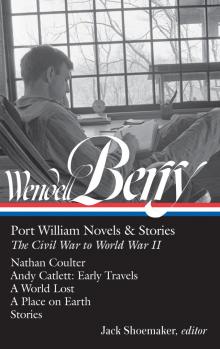 The Selected Poems of Wendell Berry
The Selected Poems of Wendell Berry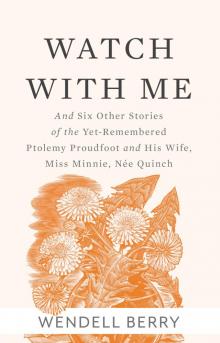 Watch With Me
Watch With Me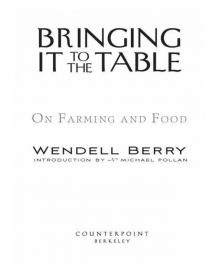 Bringing It to the Table: On Farming and Food
Bringing It to the Table: On Farming and Food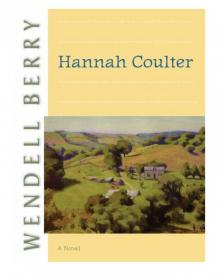 Hannah Coulter
Hannah Coulter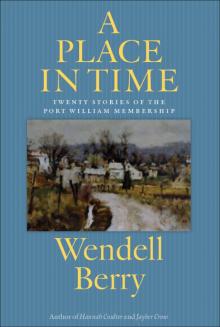 A Place in Time: Twenty Stories of the Port William Membership
A Place in Time: Twenty Stories of the Port William Membership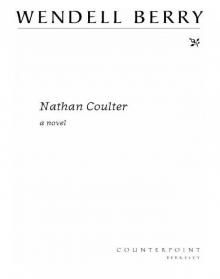 Nathan Coulter
Nathan Coulter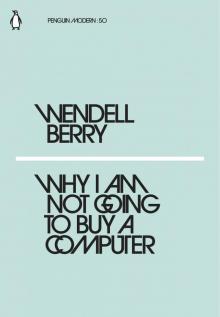 Why I Am Not Going to Buy a Computer
Why I Am Not Going to Buy a Computer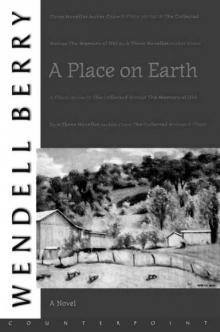 A Place on Earth
A Place on Earth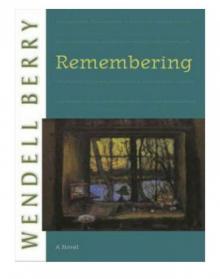 Remembering
Remembering New Collected Poems
New Collected Poems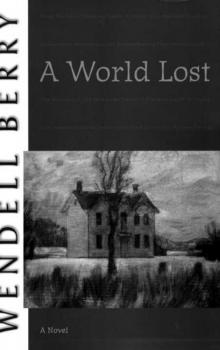 A World Lost
A World Lost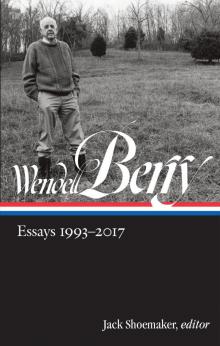 Wendell Berry
Wendell Berry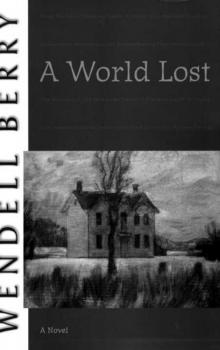 A World Lost: A Novel (Port William)
A World Lost: A Novel (Port William) Fidelity
Fidelity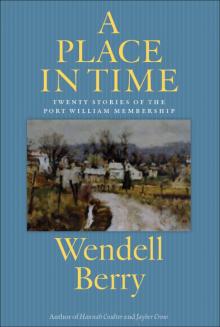 A Place in Time
A Place in Time